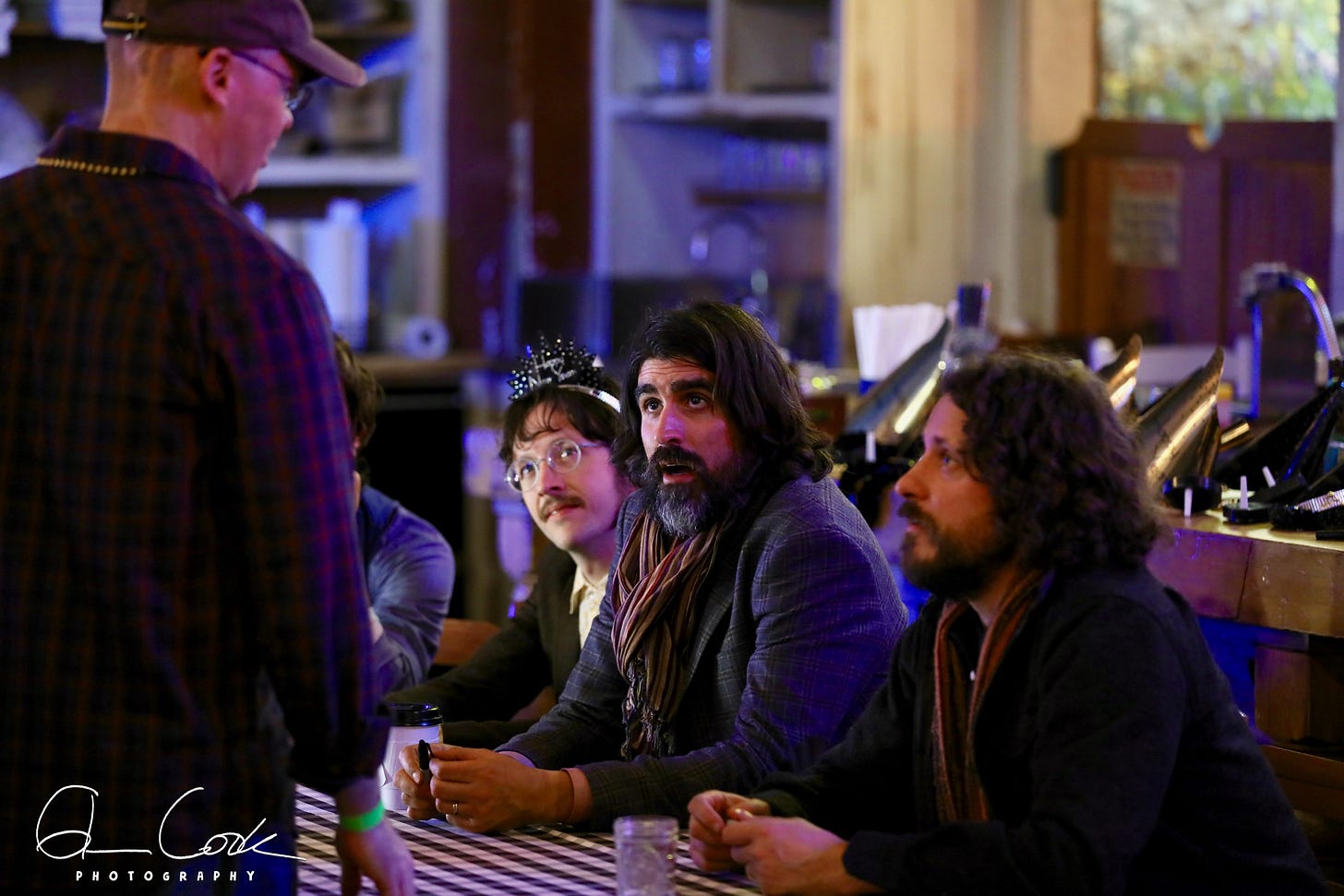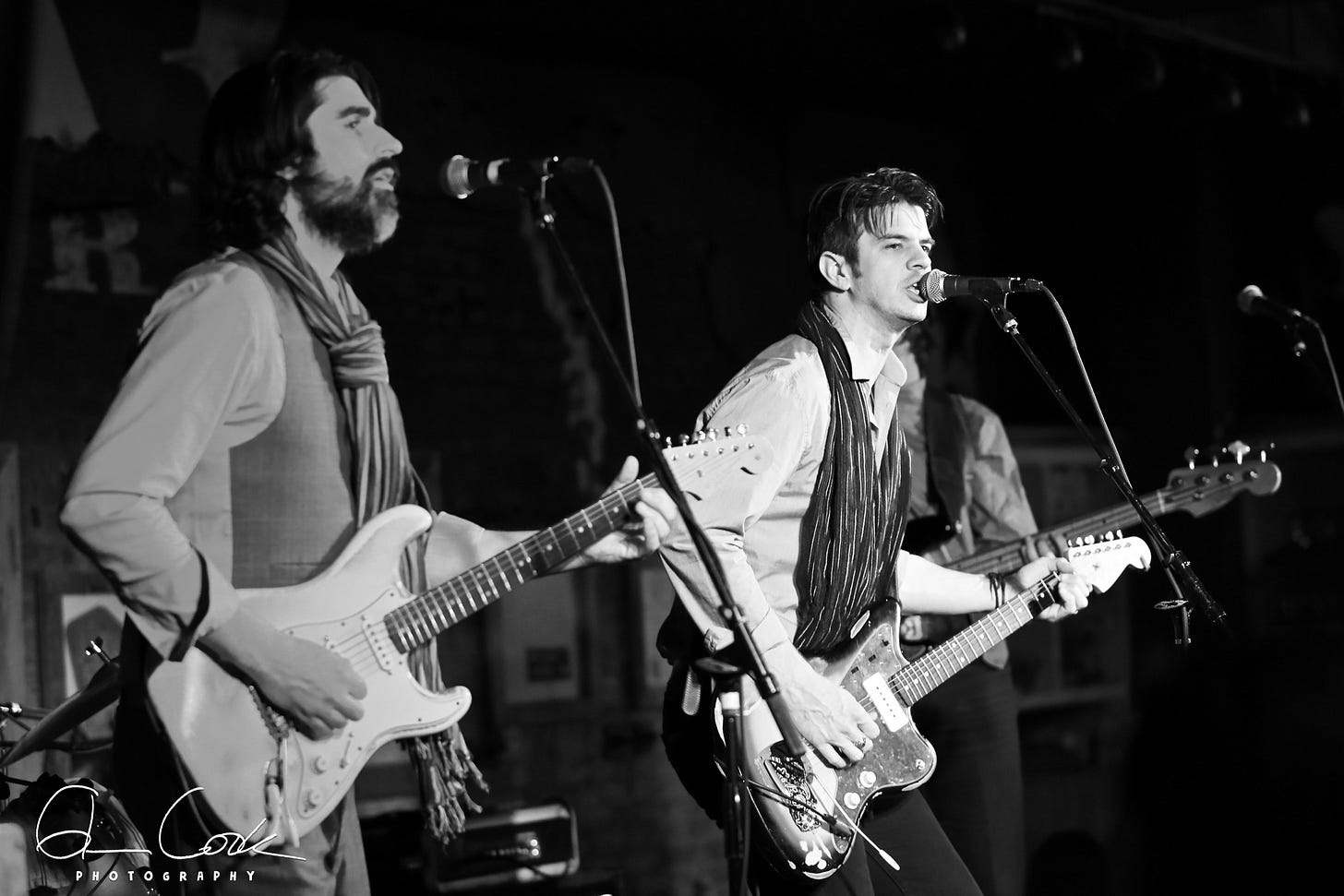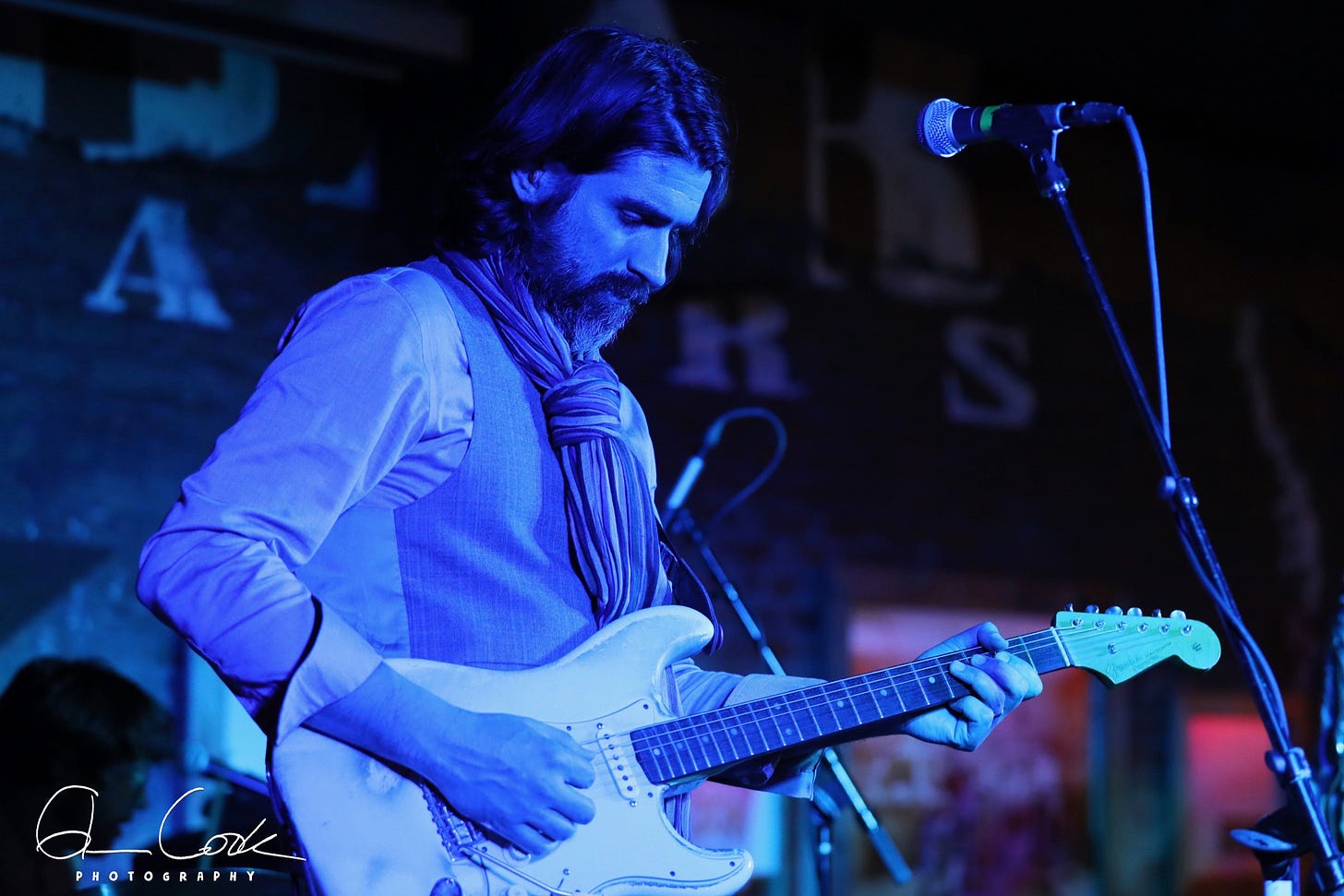Conversation: More with Ed Jurdi
Talking about fan engagement, the pandemic, band transitions, and new projects
Like most groups, the Band of Heathens found themselves in a quandary in March 2020. Members of the Austin-based group were spread out across the country, and they could not play shows or record together in the same room.
But, as group co-founder Ed Jurdi said during an interview recently, the Band of Heathens are nothing if not self-sufficient. The group “cooked up this thing” called the “Good Time Supper Club,” a popular Tuesday night variety show held over Zoom. “Remote Transmissions,” a segment of the show featuring the band performing covers with guests, became the Heathens’ latest album release, with more expected to follow.
Just as important, the show brought band co-founders Jurdi and Gordy Quist back to the Heathens’ genesis, a rotating trading of stories and songs among musicians that started in 2005. It also allowed the band’s devoted group of fans “to get a little bit of flavor of everyone's life in their own little bubble,” Jurdi says.
“The whole reason I love playing live shows is this idea that you're going to be together in a room with a group of people on a particular night. It's never going to happen again, and anything can happen. That shared experience is something we were certainly lacking in the pandemic,” Jurdi says, “and we were so pleasantly surprised how much we were able to connect with other people, and they were able to connect with us. It was just such a great bonus takeaway from all of that.”
During a brief touring break, I spent 45 minutes on the phone with Jurdi for a two-part interview. The first part looked at the band’s origins and its do-it-yourself approach to the music business and touring. This part talks about how that approach evolved during the pandemic, the band’s relationship with its fans, new music, and playing covers versus original material.
The interview has been edited for length and clarity.
How did “Remote Transmissions” become part of your Zoom broadcasts?
When we started with the Zoom things, we were just experimenting with stuff. We were reading Shakespeare and doing Goop Ridiculous sketches early on. We thought it would be a couple of months we wouldn’t be able to tour. Then it was five months. Then seven months. As we started seeing that rolling up in front of us, it's like, "All right, well, maybe we should invite some friends on just to check in with them, to be guests.”
The idea was fans of theirs can tune into our livestream, and we can turn our fans on to them. We should talk and catch up and see what's going on with them in their world. And then it became, if we're going to do that, let's collaborate on a song.
Everyone had mobile recording setups and little studios at home. It's like, "Why don't we collaborate?" We're like, "Let's pick a cover song.” We ended up doing like 45 of those. It was super fun.
Are you pleased with how the “Good Time Supper Club” evolved?
We're all able to swap songs and literally pass the ball around again. In a lot of ways, it was almost like going back to how the band started It was very loose, improvisational, a lot of just figuring stuff out on the fly. As we got into doing it more, we obviously got better at doing it. I felt like we were able to produce a show that had some production quality for people that had better sound systems or video systems at home to watch and enjoy.
With limited abilities, sometimes you end up being able to do cool things. “Remote Transmissions” was one, being able to collaborate with so many awesome friends who happen to be great artists and creative people. It was something that we would have never been able to do not faced with those circumstances. Everyone was home and everyone had time.
Just being able to cover such a wide spectrum of music through doing that was just super fun. Every week, we had work to do — a project to work on — and something to keep us sane. It was like, "Let's put our heads together. Let's be creative. Let's find stuff to do." It's definitely the ultimate case of making lemonade out of lemons.
We were able to sustain ourselves financially through the whole pandemic. Everybody paid their bills and rent through what was an otherwise impossible time for people that normally make a living traveling and playing shows for people in public spaces.
The engagement between the band and your fan base is unlike a lot of relationships I've seen before. You have a very active Patreon page, for example. How did the pandemic change that?
As artists, we might get to meet two or three people after a show if we're at the merchandise booth or something like that and get to talk to them for a couple of minutes.
Throughout the pandemic, every week with the Good Time Supper Club show, we started seeing familiar faces. Gordy and I were also doing a lot of private Zoom concerts on the weekends. We'd have a half-hour, 45 minutes to get to talk to them and get to know them.
Band members meet with fans prior to the group’s New Years 2019 show in Washington, D.C.
We started to develop these friendships. It was a connection that was helpful for them and for us in terms of just surviving the insanity of the pandemic. We were able to connect with folks and put faces to names of people that have supported what we do for a long time. It's really become like our extended family.
These people are big fans of the band, but they're also big supporters of everyone as individuals. On this last tour we did, in a few places, a big group of folks got together through meeting in the Good Time Supper Club on Patreon and through our fan site (the One Foot in the Ether chat group on Facebook). It's really cool to see it. It's been an unexpected delight and a bonus that this has just popped up.
Are you planning to release more Remote Transmissions? The first was labeled as Volume 1.
I think so. I would imagine there's going to be some subsequent volumes in the future. The response to that has been great. People have really loved it. We don't have specific plans to do it right now because we have a lot of original music that we want to release.
I definitely could see more of that stuff coming out because there was such a breadth that we were able to cover, which was super fun from a creative point of view. There's like 45 tracks. Honestly, picking 10 was nearly impossible. [chuckles] That was just like throwing darts.
What’s the difference between performing something you wrote and a cover?
Sometimes when you're performing other people's material, there's a liberating aspect to it. You can appreciate it for just being a great song and you can inhabit the character or the characters that live in the song. We usually want to do something different with them than the original version. Usually, you hear someone do a cover, there's always "the version of the song." A lot of times trying to replicate that is just a losing battle.
When you hear Elvis, Janis Joplin, Joe Cocker, or Aretha Franklin sing a song, you think, "Oh, that's one of their songs." Whoever wrote it is almost immaterial at a certain point. When you're presenting other people's material, if you’re able to step into the shoes of the song and inhabit it in a way that's just genuine, that's the goal.
A song like Look at Miss Ohio, for example, is something that's been a staple in our live shows and in our catalog for a long time. That's a great song by Gillian Welch and Dave Rawlings that they do in a very specific way with two acoustic guitars. That’s really awesome, but in the setting of this band and in this format, how can we do something different with it. I feel like we find a way to do that with that song.
What’s interesting is “Remote Transmissions” was actually a digression from the way we normally approach doing covers because we were all working remotely. Usually, the song would start with one person laying down the foundation of a track. We had to play it pretty close, pretty faithfully to the original. We couldn’t collaborate in the same room and bounce these ideas off and have something become something that it wasn't. We needed a tangible point to start from, and I think it turned out pretty well.
Let’s talk about transitions. Over the years, the Band of Heathens has gone through two major lineup changes, with only you and Gordy as the constants. The first was before the recording of “Sunday Morning Record,” when co-founder Colin Brooks left; the second was just within the past couple of months, when Richard Millsap and Jessie Wilson departed just before your most recent tour. How do you deal with those changes?
Gordy and I have been partners for 17 years now in this thing. Trevor, our keyboard player, has been in the band for 12, or 13, but really has been in and out involved since the beginning.
I've been a fan of bands forever. Over time, bands change. Everybody has their favorite time of a band, or whatever. I think a lot of that has to do with whenever you're introduced to the music, and you come into it. If you've listened to our band for a long time, we've had a couple of pretty substantial changes, and the sound and the vibe of things has shifted a bit, but with the original intent and spirit of it always being intact.
In our best world, you get together with other people and you're collaborating with them, and that's always something that is sustainable. It's always something that is exciting for everyone creatively. It works for you financially, and it's something that can continue indefinitely. That's who we've always invested in and believed in.
Like everybody knows, there's life. [chuckles] That gets in the way, and people have other ideas. They want to do different things, and they have other opportunities, and that's what happens. At that point, we've always been faced with, "All right, are we going to keep going or are we going to do something else?"
With Gordy and me being the primary songwriters and singers in the band, for lack of a better way of putting it, we felt like the spirit and the intent of what we're doing and the sound of it is intact enough that we could continue to pursue what we're doing with a different rhythm section at this point.
If we felt like we couldn’t do that, we would stop doing it, or we would do something different. Or Gordy and I would do something different and call it something different. We never really had that feeling.
When I saw you in D.C. in May, you could see the new band members — bass player Nick Jay and drummer Clint Simmons — are really good.
I think this iteration of the band might the best vocal iteration of the band, which is great, minus the fact that I couldn't sing when you came to see our show. We have five guys in the band now that can all really sing well. That's super exciting, and I'm sure that's going to inform what we do whenever it's time to make a record with this group of people. That's really the only way to approach it, I think.
I think we're appreciative of what we were able to do with Richard and Jesse when they were in the band. It was an awesome time for the band, it was super creative. Now, it's like, "Okay, well, we're on to a new phase now. Clint, our drummer, and Nate, the bass player, these guys are super talented. Let's figure out where their talents lie and how we can incorporate it into what we do and make that something really cool." It's just new challenges, new things to explore.
What’s next for the band?
We have a record that's mixed and in the can that should be coming out sometime next year. We're just finishing up some stuff, figuring out artwork and coming up with an album title. When you're working in a collaborative, those are the things that always [chuckles] take a little while to be able to get a consensus on, but that's always fun.
For us, the last bunch of years have been a really creative and prolific period for us. We have a lot of music coming out. Every month for the next five months, we’re dropping some singles that are probably going to be part of a larger collection at some point. We called it “Cutting Room Floor,” and it consists of extra songs from the last several records we've made. I think we've had 10 or 15 extra songs on each of them that we're completely recorded and mixed and everything. We're starting to slowly release those.
We have a lot of music to put out, and then we'll have some shows to come out and support them. It's great. We're super excited about all of it.
This interview was published on the Americana Highways website in a condensed version.
Go to the link below for a review of the group’s May 2022 show at Union Stage in Washington, D.C., with a video of photo highlights set to a live version of “Look at Miss Ohio.” To see full albums of the two BOH shows I’ve shot, go here and here.
The Band of Heathens will be on the road all summer, including a performance Aug. 4 at The Bullpen in Washington, D.C. For tour dates, go here.




